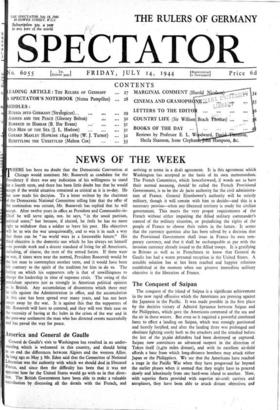America and General de Gaulle
General de Gaulle's visit to Washington has resulted in an under- standing which is welcomed in this country, and should bring to an end the differences between Algiers and the western Allies. As long ago as May 3 Mr. Eden said that the Committee of National Liberation was the authority with which we should deal in liberated France, and since then the difficulty has been that it was not apparent how far the United States would go with us in that direc- iton. The British Government have been able to make a valuable contribution by discussing all the details with the French, and
arriving at terms in a draft agreement. It is this agreement which Washington has accepted as the basis of its own memorandum. The French Committee, which henceforward, if words are to have their normal meaning, should be called the French Provisional Government, is to be the de facto authority for the civil administra- tion of France. General Eisenhower's authority will be strictly military, though it will remain with him to decide—and this is a necessary proviso—when any liberated territory is ready for civilian government. This meets the very proper requirements of the French without either impairing the Allied military commander's control of the military situation, or prejudicing the rights of the people of France to choose their rulers in the future.. It seems that the currency question also has been solved by a decision that the Provisional Government shall issue in France its own tem- porary currency, and that it shall be exchangeable at par with the invasion currency already issued to the Allied troops. It is gratifying to Britons as well as to Frenchmen to know that General de Gaulle has had a warm personal reception in the United States. A sensible solution has at last been reached and happier relations established at the moment when our greatest immediate military objective is the liberation of France.


























